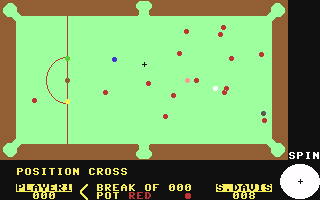How to teach AI to make thoughtful mistakes
 Computer game developers have raised an interesting topic for discussion : how to increase the realism of artificial intelligence, which operates unmistakably. The problem is that in many computer games the right move or solution is calculated too simply for the most powerful processors of modern PCs. For example, in virtual billiards, a computer is never wrong and always calculates the ideal trajectory of the ball. The same pitiable situation in chess.
Computer game developers have raised an interesting topic for discussion : how to increase the realism of artificial intelligence, which operates unmistakably. The problem is that in many computer games the right move or solution is calculated too simply for the most powerful processors of modern PCs. For example, in virtual billiards, a computer is never wrong and always calculates the ideal trajectory of the ball. The same pitiable situation in chess.The easiest way to stupid AI is to border its computational resources. Of course, the program will immediately begin to play worse. For the same billiard there is the following option: to add random error to the impact on the correct trajectory. But the problem is that it reduces the realism of the game. In this case, the computer starts to make too stupid mistakes. Such stupid people as they would never do.
In other words, the usual deterioration in the quality of the AI game is not realistic enough. It does not give pleasure to the player.
')
From this position there is one way out. It is necessary to make the computer play at full strength, but at the same time handed over the game. As in sports - a number of small, at first glance, random blunders that lead to loss or significantly increase the chances of the enemy. That is, the AI must make intelligent, thoughtful mistakes.
“Errors” of this kind require significantly more computational resources than fair play at full strength, but then a person will have a real chance to defeat a strong opponent. Game developers are required to display remarkable intelligence in order to create this kind of “artificial stupidity”.
 For example, in poker for AI, it would be logical for a big raise of a live player to fold a hand that has 75% to win, because weak human players do just that, they get scared of big raises. Or it would be logical to answer small raises with a weak hand that has insufficient chances of success. Again, because weak human players do just that. All these are examples of intellectual, thoughtful nonsense, which makes the gameplay more exciting and realistic.
For example, in poker for AI, it would be logical for a big raise of a live player to fold a hand that has 75% to win, because weak human players do just that, they get scared of big raises. Or it would be logical to answer small raises with a weak hand that has insufficient chances of success. Again, because weak human players do just that. All these are examples of intellectual, thoughtful nonsense, which makes the gameplay more exciting and realistic.The creator of the game, Steve Davis World Snooker, which came out 20 years ago, recalls how outraged gamers came to his office and still complained about the computer playing too well, although at a weak level serious errors were added to the AI calculation. People liked that the computer misses a lot. But they assured that the AI is too good positional game.
The paradox is that the position of the cue ball was never calculated. The program simply took the coordinates of the object ball, calculated the desired angle and struck with the force that was necessary to put the ball in the pocket. The position of the cue ball after the collision with the object ball was completely random. Why did gamers consider AI too strong? The reason is that the computer could have hammered the ball from any position, so that any position of the cue ball in fact has always been beneficial for him - and the person understood this. So, this is where the potential for the manifestation of "intellectual stupidity" lies, which makes the game more exciting.
For snooker, a good choice would be to calculate the position of the cue ball to the very end and sometimes specifically to beat it so that the cue ball eventually occupies a clearly disadvantageous position to continue the series. That is, the computer sometimes has to drive itself into a corner. Again, as human players do (only they do it by chance).
Summarizing all the above, we can conclude. To make AI more stupid, we, game developers, should not reduce the accuracy of the calculation, but on the contrary - increase it. We must count the moves in the game so far that a person does not even suspect a trick. The AI must be not only smarter than a man, but smarter than his two heads in order to realistically follow him. It is necessary to predict a person for several moves ahead in order to fine-tune the ideal chance, which he will use. Or will not use, but then will lose. But we still have to give him a chance.
via Gamasutra
Source: https://habr.com/ru/post/54975/
All Articles